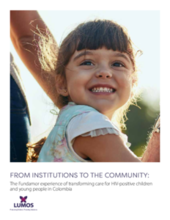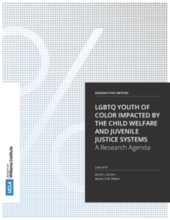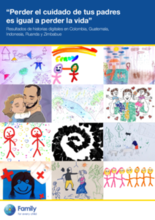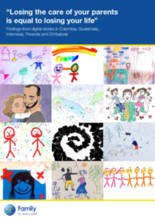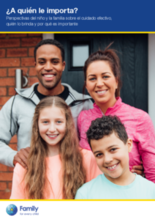This page contains documents and other resources related to children's care in the Americas. Browse resources by region, country, or category.
Displaying 581 - 590 of 1438
This study used qualitative telephone interviews with participants sampled from a statewide cohort of newly-hired, frontline child welfare workers. The authors used thematic analysis to consider participants' training experiences and the conditions that facilitated meaning.
This small pilot project was conducted to start to understand and compare the situation of grandmothers caring for children in a diverse range of countries when their parents are in prison.
This report documents Fundamor's process of closing its institution in Colombia and moving children to family-based care, drawing out successes and challenges.
The aims of this study were (1) to estimate child welfare characteristics in a sample of homeless young people in the US who engaged in commercial sex (CS); and (2) to compare young people who were sex trafficked (ST) to those who engaged in some other form of CS.
As part of a 3‐year US federal project of family group conferences (FGCs) in one jurisdiction, this study collected fidelity data from professional and family member participants of FGCs, including children and young people. Descriptive data from a small sample of child and young people participating in FGC suggest differences in their perspectives regarding family empowerment, transparency, and inclusion in decision making, when compared with the perspectives of other family members and professionals for whom data are available.
This report from t he Williams Institute is a collection of working papers focused on understanding what we know and what we need to better understand about the lives and outcomes of system-involved youth who are both LGBTQ and racial/ethnic minorities, including those involved in the US child welfare system.
This article from Marquette Law Review focuses on how children and parents interacting with the child welfare system in the US experience the removal process, the genesis of a foster care case.
This report explores what family means to children and adults in five countries using the digital storytelling technique.
Pese a que hay un consenso sobre la importancia del cuidado efectivo en las familias para los niños, existe una falta de discusión y acuerdo sobre los componentes precisos de este cuidado. Este informe contribuye a debatir sobre este importante tema al proporcionar perspectivas de los grupos focales con 198 niños y 81 adultos de Brasil, Colombia, Egipto, México, Rusia, Ruanda y Zimbabue.


